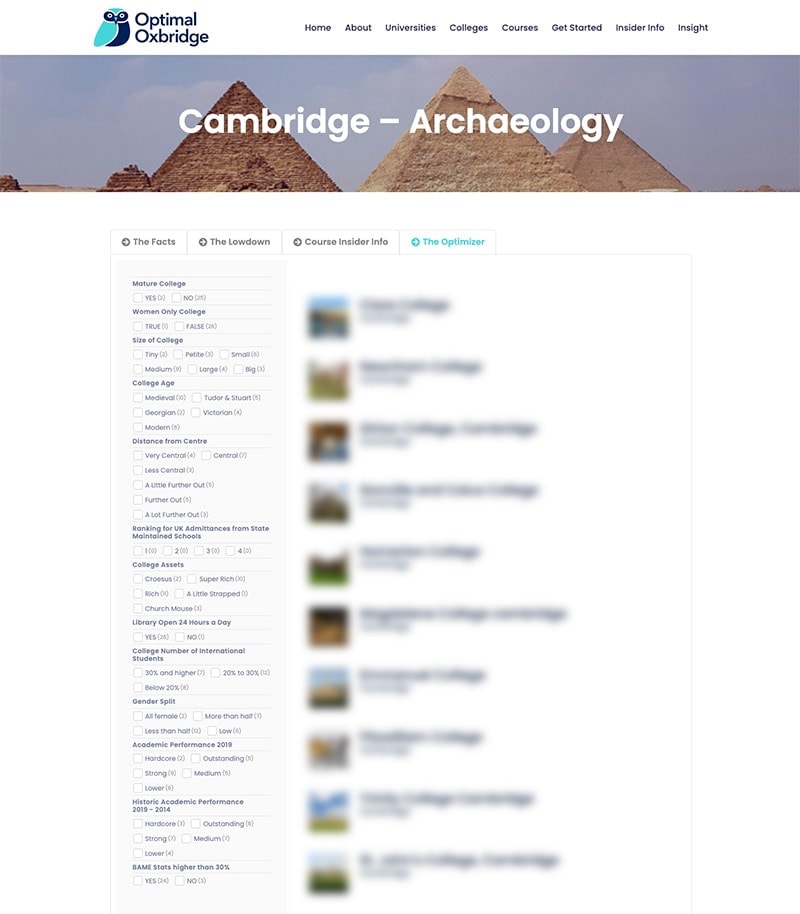Subscribe for full access to insider info and the optimizer.
Unlock access to the Optimizer and Insider Info
Let our optimizer help you find your college match faster. We’ll screen out the bad fits so that you can review the schools you’ll like best. Who knows? You might find a college you never knew existed.
The Facts
UCAS Code:
A100
Standard Requirements:
A levels| A*A*A
IB | 40-42, 776 in HL
For other qualifications, check the Cambridge University website.
Required Subjects:
A level Chemistry and a science/maths (preferably 3 sciences). IB HL Chemistry and a science/maths (preferably 2 sciences)
Advisable Subjects:
None stated by the university.
None stated by the university.
Prospective students are advised to undertake relevant work experience.
309 in 2021. (14% offered, 13% accepted)

The Lowdown
The Cambridge Medicine course is designed to provide you with a thorough scientific grounding in a much more intense, in-depth manner than most universities. It takes a more traditional approach to studying Medicine which, whilst clinically oriented, teaches you knowledge beyond clinical medicine; unusually, there is very little patient contact. Most medical schools do not do many essays, but this remains a key part of Cambridge assessments.
A particularly interesting part of this course is the fact that in your third year you study another subject in order to qualify for the BA. These might be a Natural Science subject, or a non-science subject such as Anthropology, Management Studies, or Philosophy. This allows you the chance to explore your non-medicinal interests whilst continuing your medical studies. Medicine is one of the most competitive courses at Cambridge, with an average offer rate of 15% over the last three years. It is also characterised by an equal number of female and male students. The standard course in medicine starts with three years of learning the medical sciences, followed by another three focusing on clinical practice. Graduating from the first awards you a BA; the second grants you an MB and BChir.
In years 1 and 2, you build your scientific knowledge and skills. In your first year, you cover biochemistry, physiology, anatomy, histology, embryology, and ethics and statistics.
In your second year, you’ll explore pharmacology, neurobiology, psychology, pathology and histopathology. Most students find that second year is far more intense than the first.
In the third year, you take your selected BA subject. Your clinical studies (years 4, 5, and 6) involve a series of clinical placements in the Cambridge Biomedical Campus, Cambridge University Hospitals, and other local GPs/hospitals. These are designed to show you how to build on your biomedical knowledge and specialise in the area you want to follow later in your career.
Year 4 is core clinical practice; year 5 is specialist, and year 6 is applied. During this time, you will learn communication, procedures, research, professionalism, and clinical science.
A-Level Chemistry (or equivalent) is a requirement, and Biology is essentially required. Students will find it useful to have studied Physics and Mathematics, but it is not mandatory. You will have to take the BMAT as well. Like any medical school in the country, this degree will qualify you to work in the NHS. Cambridge, however, trains doctors who will be leaders in their speciality, but also high-ranking members in areas such as academia and management. Cambridge medics are particularly desirable, even outside of medicine.
Unlock Insider Info
Get insider intel about how to increase your chances of being offered a place, plus access interviews tips and special questions.
The Optimizer
Unlock access to the optimizer
Let our optimizer help you find your college match faster. We’ll screen out the bad fits so that you can review the schools you’ll like best. Who knows? You might find a college you never knew existed.

